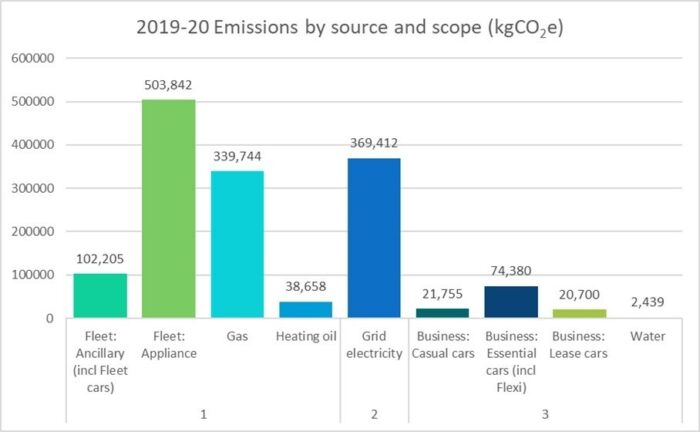Erebus Environment: Working towards Net Zero with Avon Fire & Rescue Service
IEMA member Colin Grenville, Director at Erebus Environment Ltd discusses how Avon Fire & Rescue Service (AF&RS) has already made substantial in-roads to improve their environmental performance, delivering emissions reductions of 59% by 2019-20, since their original 2008-09 baseline.‘As a responsible frontline service that directly responds to the increased extreme weather effects of climate change, Avon Fire & Rescue Service will need to adapt and be resilient to the challenges posed by climate change, as well as mitigating our impact by reducing our greenhouse gas emissions.’
Annabel Harford, AF&RS Environmental Manager
Avon Fire & Rescue Service (AF&RS) has already made substantial in-roads to improve their environmental performance, delivering emissions reductions of 59% by 2019-20, since their original 2008-09 baseline. This success reflects both the substantial efforts of AF&RS personnel and external factors such as the rapidly decarbonising electricity grid and improvements in the efficiency of new fleet vehicles as manufacturers respond to regulatory demands.
A new AF&RS Environmental Strategy for 2020-2030 was developed by Annabel Harford1, Environmental Manager for AF&RS, and approved in late 2020. This has established a Net Zero by 2030 target for the fire service and aligns with the climate commitments made by the four AF&RS local authorities in whose areas AF&RS operates.
To support Net Zero delivery, AF&RS engaged IEMA Practitioner Colin Grenville2 of Erebus Environment Ltd working in collaboration with consultant Simon Pyne of Greener Energy Futures3. Combining extensive experience in energy services, carbon management and compliance reporting, the team provided both additional skills and the necessary time resource to develop a comprehensive 2030 strategy document, mapping out a route to Net Zero.
Working with IEMA member Annabel Harford, and her colleague Simon Richards, Property Services Manager at AF&RS, the Erebus team also constructed a Net Zero project tool to draw together dozens of potential emission reduction projects across the estate of 21 fire stations, a vehicle workshop and the 24/7 control centre near Bath. The project tool enables quick analysis of the impact that each project opportunity might have on the 2030 target and identifies each project against a key source of emissions from the new 2019-20 baseline.

As each successive project was identified and its benefits quantified, it moved the emission reduction trajectory nearer the 2030 target. Achieving a viable route to Net Zero by 2030 remains a highly dynamic work in progress, with recent work focused on developing project details to support a substantial grant application for Public Sector Decarbonisation Scheme (PSDS) funding. If the application is successful, the proposed projects will deliver reductions of 90 tCO2e per year including eliminating use of heating oil and reducing gas demand through electrification of heating using air source heat pumps at several premises. The projects will also follow a logical hierarchy of reducing energy waste first and include actions to reduce demand through a range of building fabric and energy services upgrades.
Net Zero is also a core principle in future estates measures beyond the PSDS grants, and Net Zero design briefs have been developed for new build fire stations at Bath and at Weston. There are also plans to link Temple Fire Station to Bristol City Council’s district heat network which itself is working to reduce the emission intensity of delivered heat. AF&RS are also investigating procuring a proportion of their electricity directly from renewable power purchase agreements, though the low absolute volume of power used will necessitate participation in a “basket” purchasing arrangement This approach will also avoid the transactional complexity of a single user PPA deal.
Estate buildings only account for some 51% of the baseline and the less immediately addressable challenge is fleet emissions.

Frontline operational appliances, such as pumping appliances and turn-table ladders, account for over a third of baseline emissions and are especially challenging as zero carbon alternatives are only just becoming available and as yet are operationally untested. They are also substantially more expensive than conventionally fuelled appliances though this gap should narrow over time. Moreover, typical replacement lifecycles extend well beyond 2030 so it is unlikely that all vehicles will be replaced within the target timeframe. Accordingly, residual large fleet emissions look likely
and will need to be offset by alternative measures including expansion of on-site renewable generation.
Ancillary fleet and “grey” fleet offer more immediate potential for transition to low or zero emission vehicles. AF&RS have e-vans for Community Fire Safety already, and more planned. Biomethane vans are also being investigated, with a local source of fuel available. Beyond the vehicle type, changes to operational responses to emergency calls are also having a material impact in reducing mileage driven.
Having already achieved significant improvements in environmental performance, the team recognises that the hard work has now really begun and with increased urgency in a critical “decade of delivery” for the climate. Key to success will be on-going performance monitoring – not only for reporting purposes but to ensure insight is drawn from the data to inform future projects and refine approaches, both at AF&RS and in collaboration the wider emergency services community.
Please note: the views expressed in this blog are those of the individual contributing member, and are not necessarily representative of the views of IEMA or any professional institutions with which IEMA is associated.
Subscribe
Subscribe to IEMA's newsletters to receive timely articles, expert opinions, event announcements, and much more, directly in your inbox.
